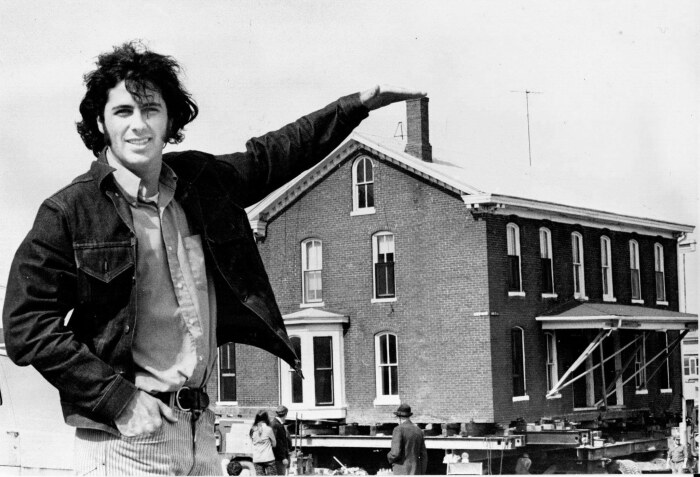This column by Daniel G. Clark about Alexander Clark (1826-1891) first appeared in the Muscatine Journal.
Few people today know how Muscatine’s tallest building came to be called the Clark House.
Local writer Marilyn “Lyn” Jackson in The Iowan magazine, Spring 1975:
Clark’s memory was revived in 1958 when, through the efforts of the A.M.E. church, the Muscatine mayor proclaimed Feb. 25 as Alexander Clark Day. This date is noted regularly by a few blacks in Muscatine, but even in his home town his name was little known until a survey of historic homes, in the fall of 1974, revealed that two houses that once belonged to a famous U.S. consular appointee were scheduled for demolition to make way for a new high-rise apartment building for low-income elderly.
Muscatine Journal (Sept. 18, 1974): “High-rise project clouded again.” Complications for “the city’s on again-off again elderly project…plagued with financial difficulties for over nine months.” New roadblock: “recent attempts by a local women’s group to preserve the home of the first U.S. ambassador to Liberia––located on the planned site of the housing project.”
“Preservation of the home…is the initial project of the newly organized Historic Homes study group of the AAUW” (American Association of University Women).
“Robert Campagna, the city’s low-rent housing administrator, said today he had received a call from a HUD offical saying support for the federally funded project would be dropped if it is again delayed.”
In a guest column, October 9, Campagna fumed: “Supposedly, by preserving the alleged residence of Alexander Clark, the memory of a Black man’s success in a white society could be remembered and, quite nobly, America’s 22 million Blacks could have ‘something to look up to, something to inspire them.’”
Campagna imagined Clark would instead favor “helping the ‘Now Problems’ of black and white people, not preserving the bricks of a long forgotten but conveniently resurrected memory.”
October 17, 1974: Thomas M. Kelly, Jr., president of the Iowa-Nebraska NAACP, said no Black organization was financially able to take on the moving and restoration effort. He urged “that the new structure be named after Alexander Clark” and incorporate suitable interpretive displays.
Des Moines Sunday Register (Nov. 7, 1974): “Moving costs may doom historic Iowa home.”
February 1975: Burtine Washington Motley of Cedar Rapids announced creation of the Alexander Clark Fund at a Muscatine bank. Donations started coming in.
April 1975: City council authorized sale for $1 to the Alexander G. Clark Historical Society, contingent on plans and promises for moving the 1878 brick double-house about 200 feet up the street.
Failure was never far away. From 1974 until 1979, the Clark-legacy drama is punctuated by missed deadlines and demolition threats. Eventually the 100-unit, 11-story high-rise would get named in honor of the forgotten leader, but it was far from a sure thing.
The Journal devoted a big spread to the June 1, 1977, dedication of the Clark House tower, ending with this: “Rev. Sammy Hooks, pastor of the Muscatine A.M.E. church gave the blessing immediately preceding the singing of ‘God Bless America’…and the ribbon cutting by Mayor Schauland and Senator Clark.”
Lyn Jackson was one of the speakers, quoted later by the paper’s editor, Gil Dietz: “I don’t know where Senator Dick Clark got his impression that Clark was the nation’s ‘first Black ambassador,’ but it seems to be a common misconception in Muscatine. I’d like to see this misconception corrected, just for the record.”
November 1978: “Mrs. Motley and a few others have been trying for four years to save the crumbling, two-story brick duplex which was moved from its original location in 1975 to make way for a low-income housing project.”
Mayor Evelyn Schauland commended the preservation efforts, but then she said: “The folks in Muscatine are sick of looking at it. We’re getting complaints every day.”
April 6, 1979: City council learns that “a historical preservationist,” Kent Sissel, has agreed to purchase the house. On a motion from Larry Kemp, they agree “to table the pending demolition order on the house for another 30 days instead of abolishing it completely.”
In 2003 the city honored Elizabeth “Bette” Veerhusen for preparing the successful nomination to the National Register of Historic Places for the Alexander Clark House. She was a 50-year member of AAUW. Sissel inherited her research materials after she died in 2004.
Bob Campagna, now a professional photographer, is “working on digital restoration of all images I took during that era” including “every first resident of the Clark House in 1977.” Those portraits will be featured in a Muscatine Art Center exhibit planned for February 2023.
Daniel G. Clark is not related to Alexander Clark but is proud to claim him as “brother by another mother.”
Top image: Bob Campagna in 1975, as photographed by Glenna Daut.

